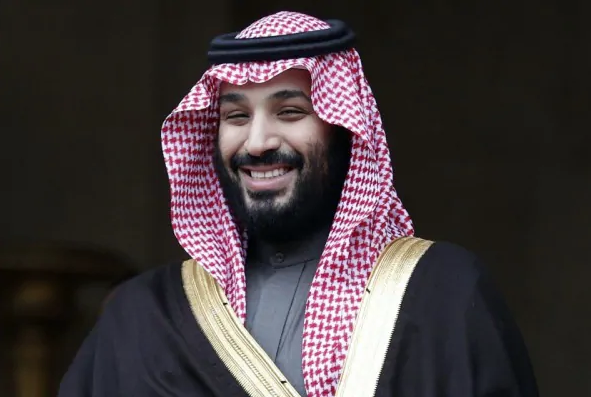Abdullah Alaoudh is a postdoctoral fellow in Islamic law and civilization at Yale University Law School and senior fellow at Georgetown University’s Center for Muslim-Christian Understanding.
Since Saudi Arabia’s current regime was established in the 1930s, a chain of kings and crown princes has either promised or attempted to implement some sort of democratic mechanisms.
However, the current crown prince, Mohammed bin Salman (or MBS, as he is commonly referred to), who is positioned as the kingdom’s leader among the royal family’s newest generation, seems intent upon taking the kingdom back to the norms of pre-modern Saudi Arabia. He has endorsed absolute monarchy more firmly and vociferously than any of his predecessors.
In an interview with the Atlantic, MBS stated that “absolute monarchy is not a threat to any country.” He added: “If it were not for absolute monarchy, you wouldn’t have the United States. The absolute monarchy in France helped the creation of the United States by giving it support. Absolute monarchy is not an enemy of the United States. It’s an ally for a very long time.”
MBS failed to note that the Colonies were revolting against an absolute monarchy. With this declaration, MBS fully embraced a pre-modern stance that had been abandoned by almost all of his predecessors, including his grandfather, King Abdulaziz, the founder of contemporary Saudi Arabia. In preaching absolute monarchy and abandoning even the mere promise of democracy, MBS’s approach to the monarchy is even more antiquated than his grandfather’s.
In 1924, when King Abdulaziz conquered the Hijaz, one of the most important regions of the Arab peninsula where Mecca is located, he promised an elected council, participatory politics based on the Islamic doctrine of consultation, and absolute freedom. King Abdulaziz denounced fake elections, a nominal parliament and unfulfilled promises to the people. In the elected council that he proposed, the elected members would have the power to check executive action, approve the budget and propose legislation. In 1926, King Abdulaziz drafted a constitution-like document that provided the theoretical framework for a degree of accountability and power-sharing.
This gesture toward constitutionalism was ultimately unrealized, but hope and the theoretical framework for democracy persisted. During the reign of King Saud, the first king among the sons of Abdulaziz, the proposal for transforming the system into a constitutional monarchy was nearly implemented. Prince Talal bin Abdulaziz published “A Letter to the Citizen” that contained the basic elements for the proposed constitutional monarchy that was to be implemented by 1960. In the proposed constitution, general human rights and freedoms were to be protected. The proposed constitution also protected the right to establish unions and guilds, a right never protected or incorporated in any subsequent Saudi Arabian legislation. When King Faisal was officially inaugurated in 1964, the constitutional project was aborted.
In 1975, then-crown prince Fahd affirmed Islam’s democratic basis, and when he became a king in 1982, he promised a parliament-like council and popular elections. It never happened. Fahd’s brother Abdullah, at the time crown prince, revived the promises for democracy and constitutional monarchy in 2003, after a number of intellectuals and activists from all sides of the political spectrum signed a petition directed to him entitled “A Vision for the Nation’s Present and Future.” The petition demanded elections, the separation of powers, human rights guarantees and an end to arbitrary detentions in the kingdom. When representatives of the group met with crown prince Abdullah, he commented on their petition, saying, “Your vision is my vision, and your project is mine.”
Several similar petitions followed. The most popular one, “Toward the State of Rights and Institutions,” was presented by my father, prominent scholar Salman al-Awdah (who has been in prison since last September), and some of his friends and signed by several thousand citizens, including me and many members of my family. The petition marked the climax of the popular activism in Saudi Arabia for constitutional monarchy and democracy in Saudi Arabia. The phenomenon, commonly referred to as the Arab Spring, likely served as a catalyst for the petition’s popularity. Yet this time, Abdullah, who had assumed the throne but has since passed away, offered no promise for democracy.
Thirty-two-year-old MBS has promised nothing but a long reign of absolute monarchy and a firmer grip on power. While ironically promising a bright economic future embodied by his initiative for a 21st-century city, Neom, he has also promised religious regression, all the way back to the conditions that resulted in the country’s most infamous terrorist attack in 1979.
Previous kings and crown princes were not eager to embrace democracy either and may not have moved honestly toward it, but their maneuver of accepting democracy as an end allowed for some healthy interaction between the people and the kings to take place. With such interactions, there was always a great chance to establish a meaningful social contract between the people and the royal family for a foundation for a more stable and democratic future.
The change of mind-set with MBS toward embracing eternal absolute power marks a dramatic shift from past democratic promises that offered some hope for the future, even though none of them were ever fulfilled. The new Saudi administration has gained positive press for its futuristic rhetoric, including talk of a robotically manned city, and for allowing women to drive. But make no mistake: We are witnessing a return to Saudi Arabia’s past. In abandoning the promise of democracy, the crown prince may actually be on his way to making Saudi Arabia more medieval than ever.



